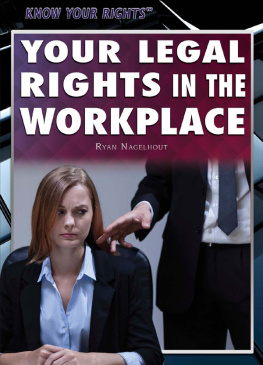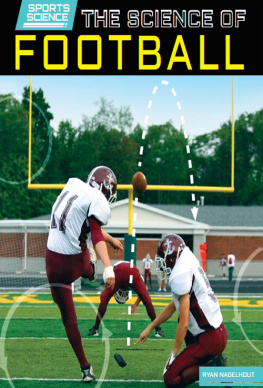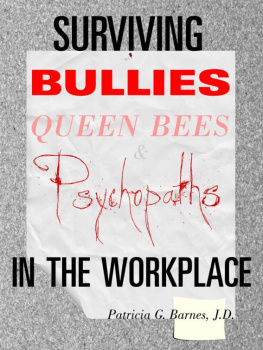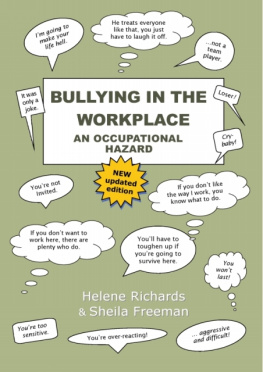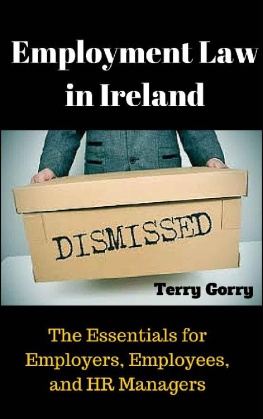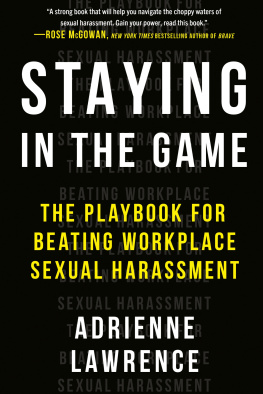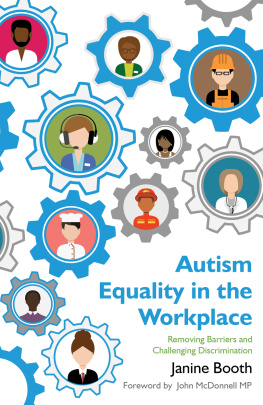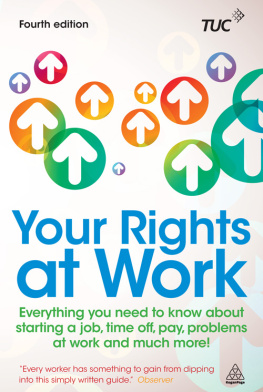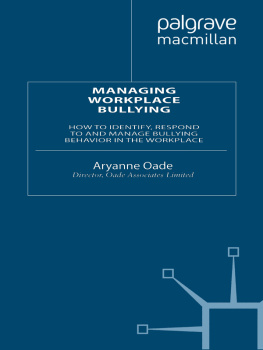Published in 2016 by The Rosen Publishing Group, Inc.
29 East 21st Street, New York, NY 10010
Copyright 2016 by The Rosen Publishing Group, Inc.
First Edition
All rights reserved. No part of this book may be reproduced in any form without permission in writing from the publisher, except by a reviewer.
Expert Reviewer: Lindsay A. Lewis, Esq.
Library of Congress Cataloging-in-Publication Data
Nagelhout, Ryan, author.
Your legal rights in the workplace/Ryan Nagelhout.
pages cm.(Know your rights)
Includes bibliographical references and index.
ISBN 978-1-4777-8044-2 (library bound) ISBN 978-1-4777-8616-1 (pbk.) ISBN 978-1-4777-8617-8 (6-pack)
1. Employee rightsUnited States. 2. Labor laws and legislation United States. 3. Industrial relationsUnited States. I. Title.
KF3457.N34 2015
342.730684dc23
2014037711
Manufactured in the United States of America
INTRODUCTION
G etting your first job is an exciting time in your life. Whether its a paper route or work at a fast-food restaurant, entering the workplace is one of the first steps to becoming an adult. Getting that first paycheck brings you into a world of disposable income and, hopefully, savings. A job also means a new place to meet people. New life experiences often mean lots of new rules to learn and understand, and following these rules is an important part of learning how to act properly in the workplace. The workplace is not just another version of school, and not following the rules can lead to real consequences.
These lessons dont always come easily, though. Learning what your rights and responsibilities are in the workplace can be the difference between a long, happy job experience or a struggle to maintain good working relationships with your superiors and peers. Its easy to get involved in a bad situation if youre not careful. Sometimes your own actions can get you into trouble if youre not aware of whats expected of you while on the job. Employers may also try to take advantage of your inexperience in the workplace. Dennise and Cherise Mofidi thought working at a Papa Murphys restaurant in Oregon would be the perfect after-school job. The sixteen-year-old twins liked working the cash register and making pizzas for customers. Soon, though, the twins became uncomfortable with sexual comments male managers made about them.
At first they were confused. Is this normal? they asked one another. One day, a manager asked Dennise to send him pictures of her breasts. The girls then started to tell family and friends and asked what they should do. The other managers at Papa Murphys didnt do anything about the harassment. Should they just quit or keep working there despite the harassment?

Working at a pizza restaurant is a common job for young workers first entering the workplace. However, any workplace can become the setting for inappropriate words or actions.
After exploring their options, the Mofidi twins filed a complaint with the Oregon Bureau of Labor and Industries (BOLI). The process was longabout a yearbut the Mofidis used the legal system and told others about their issues. They held protests and fought restaurant ownership through the system BOLI set up to investigate these issues. The two girls eventually settled with Papa Murphys. While some settlements prevent plaintiffs from discussing a case publicly, this one did not, so the Modifi sisters continue to tell their story today.
The Mofidis story is a reminder that there are ways to fight workplace harassment and protect your rights. No matter your situation, you are not alone. Not only do you have a variety of tools at your disposal to defend yourself, but there are a number of people and outlets you can contact to help you navigate what often can be a difficult experience in growing up.
Whether the aggressor or victim, within these pages you will learn about the resources and people who can help you if you commit or come in contact with sexual harassment or other workplace crimes. You will also learn how to diffuse potentially harmful situations in the workplace, as well as what resources you can consult if you have questions about crimes in the workplace.
CHAPTER 1
JOINING THE WORKFORCE
A merica in the early twentieth century had workplaces filled with child laborers. Children, sometimes five or younger, would work long hours in dangerous conditions. Many worked instead of going to school. Today, there are many laws to protect children from unfair labor practices.
Children can join the workforce at different ages depending on what job they are doing. According to federal law, someone thirteen or under can work as a babysitter, deliver newspapers, or, in some cases, work as an actor or performer. Children between fourteen and fifteen can work at amusement parks, movie theaters, and other retail stores as well as do some office work. Children between sixteen and seventeen can do any job that isnt considered hazardous, but they arent allowed to drive on the job.

Teenagers as young as fourteen can work in movie theaters. Federal law sets the standard age for different workplaces based on many factors, including how hazardous the work is.
Once you are eighteen, there are no federal restrictions on job type or how many hours you can work. Each state does have its own special rules for different types of work, as well as special rules for workers of different ages.
WAGES AND HOURS
The Fair Labor Standards Act (FLSA) sets guidelines for most workers in the United States. Workers must make at least the federally set minimum wage. The FLSA also sets a forty-hour work week, with overtime pay (one and a half times regular salary) given to hourly workers if they work more than forty hours. Employees who are tipped, such as waiters, may make $2.13 per hour but their tips must at least match minimum wage. Specific states and cities set a higher minimum wage that businesses have to follow. For example, in 2014 the city of Seattle, Washington, raised its minimum wage to a living wage of $15 per hour.
There are also hour restrictions for workers based on age. Children fourteen or fifteen years old can only work after 7 AM and until 7 PM each day, or until 9 PM from June 1 to Labor Day. Children under the age of eighteen can only work three hours per day on a school day and up to eighteen hours per week. When school is not in session, they can work up to eight hours per day and forty hours per week. While it is not federally required, some states such as Maryland, New York, and Wisconsin require children under eighteen to have a work permit before they can start a job.
Each state has different rules regarding when employees should be paid. Many states, such as California, allow employers to choose whether to pay workers twice per week (semiweekly), once per week (weekly), or once per month (monthly). Your employer should tell you what payday schedule the company uses when you are hired.

